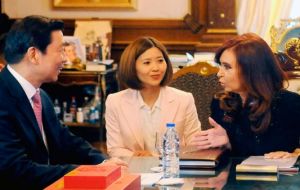MercoPress. South Atlantic News Agency
China to the rescue of Argentina with a 10 billion dollars equivalent swap
 Cristina Fernandez trying to convince Vice-president Li to accept Argentine Pesos
Cristina Fernandez trying to convince Vice-president Li to accept Argentine Pesos Argentina is negotiating with China a new 10 billon dollars equivalent swap of international reserves support based on the experience of 2009 when the global financial crisis. The new accord should theoretically help Argentina strengthen its international position vis-à-vis the run on the dollar (or the flight from the Peso) and which has cost the Central bank 4 billion dollars so far this year.
According to Buenos Aires financial media the issue was addressed and advanced last Friday when President Cristina Fernandez met visiting Vice-president Li Yuanchao and later in the Senate when the Chinese official held talks with Vice president Amador Boudou and the number two man in the Central bank, Miguel Pesce who participated in the 2009 swap agreement negotiation.
The swap does not actually mean an increase in international reserves unless there is a critical situation when a trigger goes off but it is a clear support for Argentina. In reality if the swap were to be used it could cause even more fear among investors, and the successful experience of 2009, not only with Argentina but with several Asian countries, showed there was no need to implement it.
How does the system work? If Argentina’s international reserves continue to deplete then the country could have access to a credit line of 10 billion dollars but in Yuans. In exchange Argentina delivers to China the equivalent in Argentine Pesos.
However there is another catch since pretending to change that sum of Yuans into dollars in international markets won’t be easy, so what matters is the signal, not necessarily the implementation.
The swap is thus another option the government of President Cristina Fernandez is appealing to with the purpose of reinforcing its reserves situation quiet battered because of the loss of confidence in her government and her economic policies by Argentines (and neighbouring countries).
The main instrument is the tax amnesty or whitewashing bill under consideration in Congress which would enable Argentines to exchange their undeclared assets and dollars for equivalent government promissory notes and/or bonds, which can be invested in the real estate and construction industry or in oil and gas development. No tax or costs for surfacing and the bonds will yield 4% annually.
Those dollars would yes automatically help to increase the Central bank’s reserves.




Top Comments
Disclaimer & comment rules-

-

-

Read all commentsGawd! First Papa Noel Chavez and now the Virgin Manchuria...
May 13th, 2013 - 10:53 pm 0China is really being stupid or very scheming...
Of course any loan will come with interest rates that would make a loan shark blush!
May 13th, 2013 - 11:16 pm 0This won't work because, as everyone should know, if you give money to people whom don't know how to manage it and/or are corrupt(like in this case), nothing changes. It's like giving 1 billion dollars to the somali government to build schools and hospitals, all they will actually do with the money is keep it to themselves.
May 13th, 2013 - 11:20 pm 0Commenting for this story is now closed.
If you have a Facebook account, become a fan and comment on our Facebook Page!